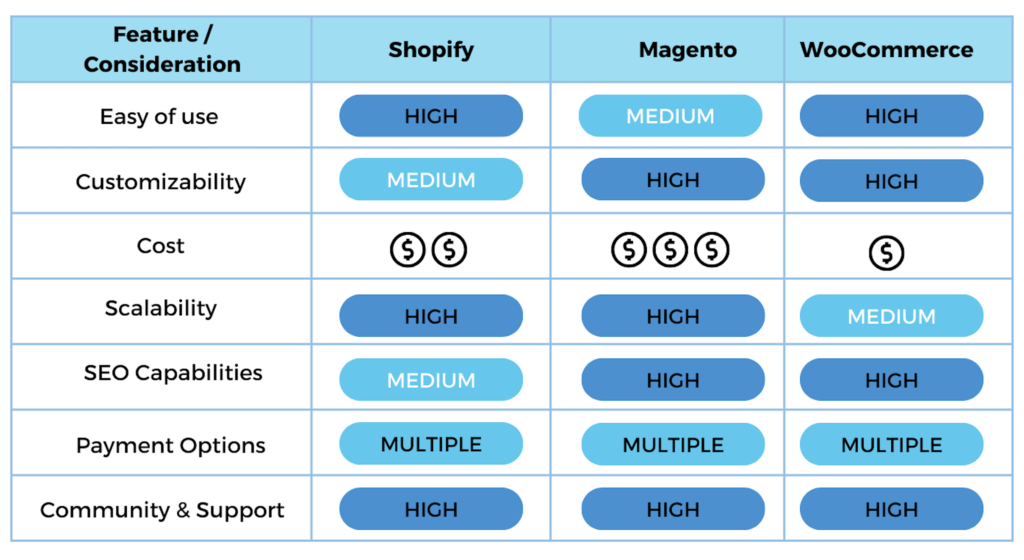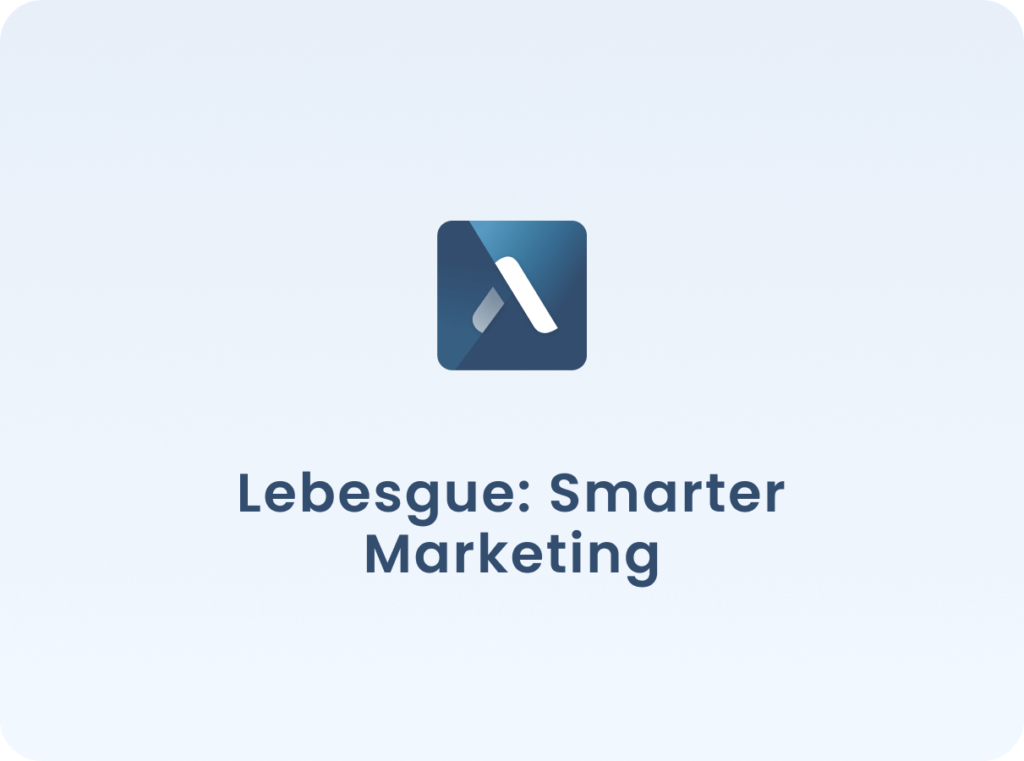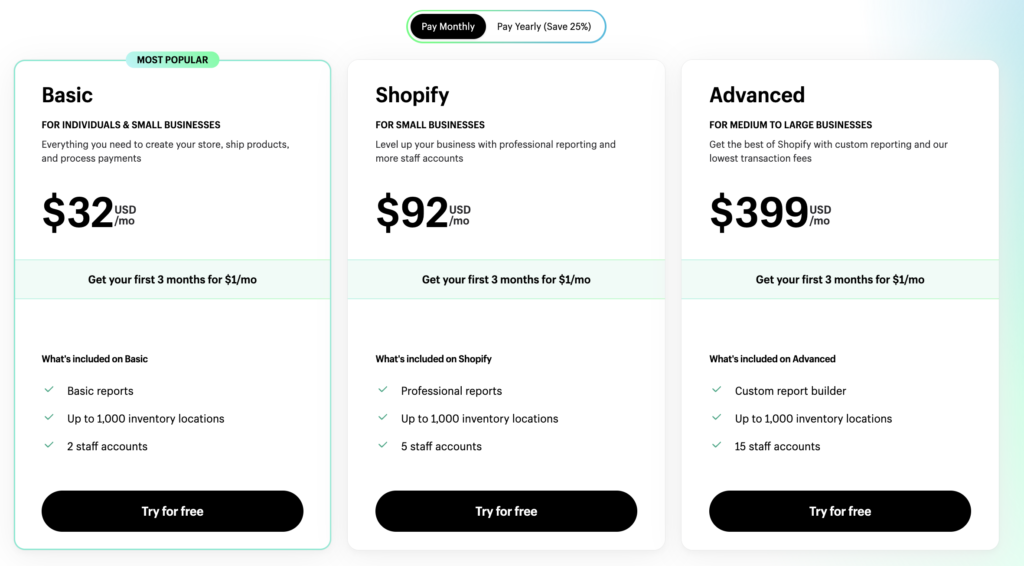Shopify vs. Magento vs. WooCommerce? Choosing the right platform for your online store is a big deal—especially if you’re just starting out. Get it right, and you’ve set yourself up for long-term success.
But, get it wrong, and you’re in for a world of complications. Whether you’re launching your first online shop or looking to switch platforms, it’s a critical decision that affects everything from your day-to-day operations to your long-term growth plans.
In this blog post, we’ll deep-dive into Shopify, Magento, and WooCommerce to help you make an informed choice that’s aligned with your business needs. So, Shopify, Magento, or WooCommerce? Let’s get started.
Making the right choice between Shopify, Magento, and WooCommerce is not an easy task. These platforms come with their own sets of pros and cons, unique features, and pricing models. Before we go into the nitty-gritty, let’s have a quick comparison to set the stage.

In conclusion, the choice between Shopify, Magento, and WooCommerce should be based on your specific business needs, budget, and technical expertise. Each platform has its strengths and weaknesses, catering to different eCommerce scenarios.
Ease of Use: User-Friendly vs. Customizable
When it comes to building an online store, one important consideration is how easy it is to use the platform. Some eCommerce platforms are like a friendly guide, easy for anyone to understand and use. Others are giving you lots of options to make your store unique, but you’ll need more effort to learn and use. Let’s explore the balance between user-friendliness and customizability in eCommerce platforms.
Shopify Ease of Use
Building an online store can be a bit complex, but Shopify simplifies the process and makes it easy for anyone. The platform offers an intuitive dashboard, clear step-by-step setup guides, and a variety of pre-designed templates to make the process accessible to users of all backgrounds.
From adding products to setting up a cart, Shopify’s user-friendly interface makes the process a breeze. And if you do hit a roadblock, their 24/7 customer support is always on standby.
Pros:
- Quick and straightforward setup
- No technical know-how needed
- Wide range of templates
Cons:
- Limited room for customization
- Some advanced features require third-party apps, which may come with additional costs
Magento Ease of Use
Shopify is known for its user-friendly, ready-to-use platform, while Magento is an open-source solution that offers extensive customization options. This makes Magento a preferred choice for developers and businesses looking for highly personalized eCommerce solutions.
So, Magento requires a steeper learning curve and isn’t particularly DIY-friendly for non-developers, but the payoff is a highly unique online store.
Pros:
- Highly customizable
- Robust set of built-in features
- Well-suited for larger businesses with specific needs
Cons:
- Not user-friendly for non-techies
- Requires ongoing maintenance and updates
WooCommerce Ease of Use
WooCommerce combines the best of both worlds by providing a user-friendly platform built on WordPress, which is renowned for its ease of use as one of the most user-friendly CMSs available. Although WooCommerce may not be as plug-and-play as Shopify, the advantage of the WordPress ecosystem is that it offers a wealth of plugins and online tutorials, making it easier for you to refine and customize your website according to your needs.
Pros:
- Highly customizable while still being user-friendly
- Integrated seamlessly with WordPress
- Extensive online community and resources
Cons:
- Some technical skills needed for optimum customization
- WordPress updates can occasionally break plugins
Cost Analysis: Budget vs. Features
Next, cost analysis. Finding the right balance between your budget and the features you need is crucial. Let’s delve into a cost analysis, comparing what you can afford with what your online store demands.
Shopify: Transparent but Restricted
With Shopify, what you see is mostly what you get in terms of cost. They offer tiered monthly plans that cover hosting, SSL certificates, and a range of essential eCommerce features. However, the price can quickly escalate when you factor in premium themes, third-party apps, and transaction fees for using non-Shopify payment gateways.
Average Cost for a Basic Store: $32/month (excluding add-ons and transaction fees)
Magento: The Investment Property
Magento is often viewed as the ‘investment property’ of eCommerce platforms, requiring a significant amount of time, skill, and money upfront. While the community edition is free, you’ll have to budget for hosting, SSL, and potentially hiring developers. Magento’s Commerce edition can cost upwards of $22,000/year, suitable for enterprise-level businesses.
Average Cost for a Basic Store: Varies widely, often in the thousands per year
WooCommerce: The Budget-Friendly Option
WooCommerce itself is free, but that’s a bit deceptive. You’ll need to account for the cost of WooCommerce hosting, an SSL certificate, and any premium plugins you might require. Yet, it often remains the most cost-effective solution for small to medium-sized businesses.
Average Cost for a Basic Store: $20/month for hosting + additional costs for plugins and themes
Scalability: Shopify vs. Magento vs. WooCommerce
When planning for the future of your online business, scalability is a pivotal factor. In this section, we’ll explore how Shopify, Magento, and WooCommerce stack up in terms of their scalability capabilities.
Shopify: Scalability
Shopify doesn’t just cater to small startups; its scalability options make it a viable solution for growing businesses too. With higher-tier plans like Shopify Plus, you can manage multiple storefronts, employ advanced analytics, and even automate workflows, all within Shopify’s ecosystem.
Pros:
- Built-in scalability with higher-tier plans
- Doesn’t require migration to a new platform for growth
- Lower IT costs compared to more technical platforms
Cons:
- Expensive scaling options
- Limited by the platform’s inherent capabilities
Magento: Scalability
Magento is robust enough to handle large-scale operations right out of the box. With the capability to host up to 500,000 products and handle over 80,000 orders per hour, it’s a powerhouse. However, this scalability comes with the need for higher processing power and server resources, making it a costly affair.
Pros:
- Tailor-made for large-scale operations
- High ceiling for adding products and processing orders
- Strong enterprise solutions with Magento Commerce
Cons:
- Requires a dedicated IT team for maintenance
- Scaling can become a complex and costly process
WooCommerce: Scalability
WooCommerce offers the kind of flexibility that lets you start small and scale big. Thanks to the open-source nature of WordPress, you can add as many plugins and customizations as you need. However, like Magento, as you grow, you may need to consider dedicated hosting solutions and possibly a development team.
Pros:
- Extremely flexible scaling options
- Low-cost initial setup allows for gradual investment
- A vast array of plugins for added functionalities
Cons:
- May require hardware upgrades as the business grows
- Dependency on multiple plugins can affect site performance
Integrations and Ecosystem
When choosing between Shopify, Magento, and WooCommerce for your online store, it’s essential to consider how well they work with other tools. These platforms offer different ways to connect to external services and expand your store’s abilities. In this section, we’ll explore how each of these platforms handles integrations and the benefits and drawbacks of their approaches.
The Shopify App Store
One of Shopify’s standout features is its vibrant App Store. From marketing automation to SEO tools, there’s almost certainly an app for any feature you need. Most of these are easy to integrate, making it hassle-free to extend your store’s capabilities.
Pros:
- Wide range of third-party apps
- Easy integration without technical skills
- Quality control through Shopify’s approval process for apps
Cons:
- Costs can add up with multiple premium apps
- Limited customization for integrated solutions
Magento: Endless Possibilities, With a Caveat
Magento’s open-source nature allows for endless custom integrations. Whether you want advanced analytics, ERP systems, or custom-built features, Magento can accommodate. However, implementing these often requires a skilled developer.
Pros:
- Limitless possibilities for custom integrations
- Strong API support for connecting with third-party services
- Advanced built-in features reduce the need for some third-party integrations
Cons:
- Requires technical expertise for most integrations
- Potential compatibility issues between custom modules
WordPress Plugins
Being built on WordPress has its advantages. WooCommerce inherits a world of extensible plugins and themes. Plus, its API allows for custom integrations if you have specific needs that existing plugins can’t meet.
Pros:
- Access to WordPress’ vast ecosystem of plugins
- Easy to implement standard integrations
- Flexible API for custom needs
Cons:
- The quality of plugins can be inconsistent
- Potential conflicts between WordPress and WooCommerce plugins
Cost-effectiveness: Maximizing ROI with Lebesgue
In the world of e-commerce, every cent counts. When choosing between Shopify, Magento, and WooCommerce, it’s crucial to consider which platform will offer you the best return on investment (ROI). And here’s where Lebesgue’s AI CMO tool is a game-changer.
Lebesgue’s Unique Features
- Automated Advertising Audit: Get in-depth reports that assess the efficiency of your advertising channels.
- Market Benchmarks: Understand how your campaigns stack up against industry standards for better strategic planning.
- LTV Analysis: Lebesgue’s Lifetime Value Analysis feature measures the impact of each marketing channel on your long-term customer results.
Current Platform Support and Future Integration
As of now, Lebesgue supports Shopify and WooCommerce. This means you can readily integrate Lebesgue’s advanced AI capabilities with these platforms to optimize your ad campaigns and overall ROI. The good news for Magento users is that an integration is in the pipeline and coming soon.
Shopify vs. Magento vs. WooCommerce: Community and Support
Now, let’s talk about something crucial when choosing between Shopify, Magento, and WooCommerce for your online store: the support and community. These platforms offer different levels of assistance and a place to connect with others. In this section, we’ll explore how each platform’s community and support can impact your eCommerce journey.
Shopify offers round-the-clock customer support through phone, email, and live chat. Additionally, its community forums and extensive documentation make troubleshooting easier.
Magento has a strong open-source community where you can find free resources and advice. However, for more direct support, you might need to purchase Magento Commerce, which comes with dedicated technical support.
WooCommerce relies heavily on self-help resources like forums, documentation, and online courses. The larger WordPress community also offers extensive support through various channels.
Summing up: Shopify vs. Magento vs. WooCommerce
Whether you’re starting a small online boutique or planning a large e-commerce empire, choosing the right platform is crucial. While Shopify offers ease of use and scalability, Magento is ideal for those who need a robust and customizable platform. WooCommerce falls somewhere in between, offering flexibility with a user-friendly interface.
If you’re still undecided, remember that platforms like Shopify, Magento, and WooCommerce are just tools in your broader strategy. Check out our previous blog post about how to combine Facebook, Google, and Pinterest ads for a multi-channel approach.
⭐⭐⭐⭐⭐
100+ five-star reviews on Shopify App Store
Be the first to receive the latest advertising benchmarks, insights, and tips right in your inbox.






No comment yet, add your voice below!